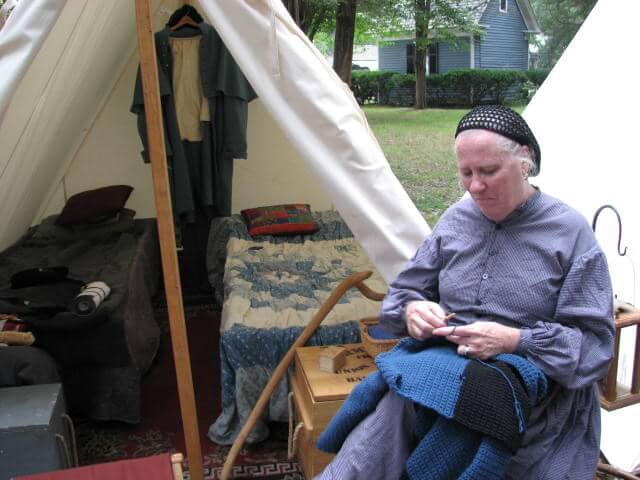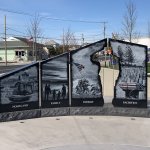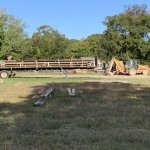COLD SPRING – Mrs. Nancy Summers did not appear on the roles of fighting men for D Company, 17th Virginia Infantry in 1862, but her husband Private Charles Summers did. According to Civil War re-enactor Clare Juechter both joined the Confederate army in Charlotte, Virginia to confront the Yankee invaders as best they could.
Nancy served as a washer woman for her husband, while Charles engaged the Northern forces in battle. Juechter stated that later, after Summers’ husband was captured and subsequently died in captivity, she continued to provide laundry services to the men of the 17th Virginia under the protection of the Captain.
“She took money from each soldier to pay her for her services and I even found letters that spoke about the Captain withholding money from soldier’s pay for her work.”
Juechter re-enacts the role of Nancy Summers to honor her memory and to ensure that the story of the so called “camp followers” is accurately told. She stated that “In the South, many of these women were actually refuges”.
She related that in the south, a great number of women found themselves homeless due to the scourge of warfare in their hometowns and farms. These women, in order to try to survive, sought to follow the army as it moved from battle to battle to provide cleaning, mending and cooking services to the troops, just to survive.
These women lived separately from the troops and had a difficult time keeping up with the army since they had no wagons and few horses to help carry their burdens. “This was no easy life” said Juechter.
She added that some camp followers were actually slaves that had been abandoned by their southern owners because of the economic hardships caused by the war. These women, usually field hands, were too expensive to feed, so they were left to forage on their own. Often that included following the army to provide some services in exchange for food.
The women who provided other “comforts” were relegated to separate arrangements and did not mingle with the women who traveled with the army. Some say the term “hooker” derives from the Civil War general Joseph “Fightin Joe” Hooker who is said to have encouraged this form of comfort to bolster morale among his troops.
Elza Williams, who also portrays the roles filled by the women of the Civil War, also described the extent of female soldiers who actually masqueraded as men, to join front line units and engaged in combat. She related that although the number of women who engaged in battle is unknown, the number is thought to be much higher than most current estimates. She stated that “most were never discovered unless they were wounded and had to be treated”.
Williams added that if the army was stationed close to the city, women would come out to write letters for illiterate troops, do chores and provide medical assistance, but they would not travel with the army when it moved on.
They did try to “bring a little bit of home” to the soldiers as best they could. The North also had their version of “camp followers” who provided slightly more structured help to the Northern Armies, including the U.S. Sanitary Commission.
The women of the 69th Irish Regiment of Pennsylvania (mostly Philadelphians), and those of the 71st Pennsylvania Volunteers, Company K had their own reasons to serve their men. Although these women were not refugees like their southern counterparts, they did provide similar services to the Northern men under arms. According to reenactors Andrea Ashcroft, Peggy White and Nancy Brown, many women of the North became the first “Rosie the Riveters” of World War II fame in that they began taking over jobs that had been traditionally man’s work while the men went off to war.
They became the shopkeepers, clerks and in many cases held manufacturing jobs that kept the North’s economic engine running at full throttle. Just like “Rosie” in 1945, when the war ended in 1865, the men came home looking for their jobs. The problem was that many women were not ready to give up those jobs. It can be said that this was the real beginning of the women’s movement as women realized that they were often equally or more capable as their male counterparts in many cases.
The women of the north also provided medical services through the US Sanitary commission that was created in 1861 to support sick and wounded soldiers. This private relief agency raised $25 million dollars (in Civil War era dollars) to accomplish their mission. Northern women also wrote letters for soldiers, and worked as laundresses and seamstresses. The Northern armies also received the services of “soiled doves” who followed the army to provide their comfort services as well. As always, the similarities between enemies often outnumber the dissimilarities.
All the re-enactors, both North and South, agreed on one overriding principle. The deprivation, hunger, disease, violence and loneliness suffered by the soldiers of this war on both sides was eased somewhat by these women, whether they served as soldiers in disguise, or as washerwomen, or “soiled doves”. These modern day women believe that their story, the complete story of Civil War camp followers, has yet to be told.
Dennis Township – The parents of Dennis Township need to know that their children are not receiving Basic Skills Services. The BSI teacher has been “acting principal” and doing way more admin work than actually…








